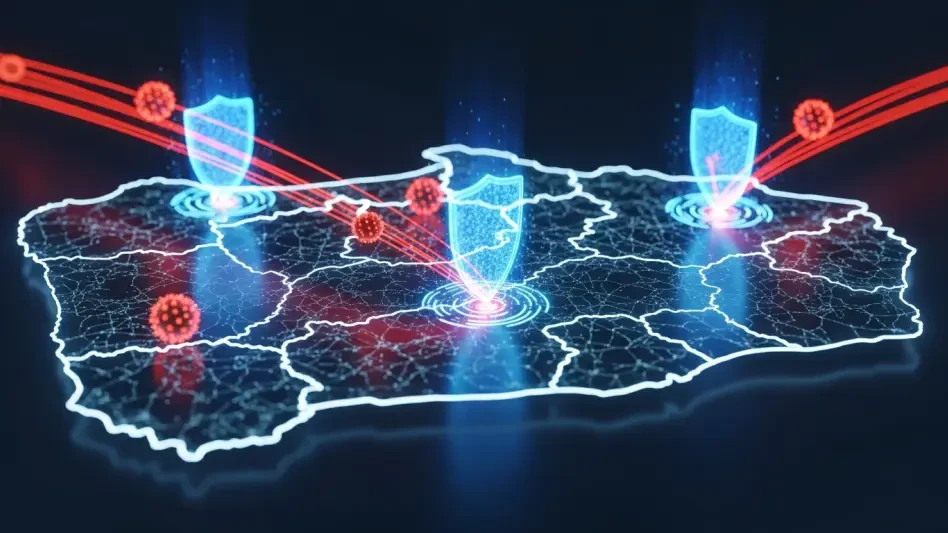The complex web of cybercrime targeting major retailers in the UK recently saw a breakthrough as authorities arrested four individuals linked to sophisticated attacks on giants like Marks & Spencer, Co-op, and Harrods. The arrests highlight ongoing efforts by the National Crime Agency (NCA) to address the persistent threat posed by advanced cybercrime organizations such as Scattered Spider. With significant financial consequences and operational disruptions caused by these cyberattacks, law enforcement’s success in apprehending suspects reflects the intense pressure faced by businesses to bolster their cybersecurity defenses. This development underscores the challenges of combating organized cyber threats, which utilize cutting-edge techniques to infiltrate and compromise corporate systems. The narrative around these events emphasizes the increasing frequency and complexity of such attacks, urging for a stronger international cooperative approach and advanced security measures.
Recent Arrests and Investigations
The arrests were monumental strides in curbing cybercriminal endeavors, with the NCA detaining two 19-year-olds, a 17-year-old, and a 20-year-old in West Midlands and London. Charged with violations including breaches of the Computer Misuse Act, blackmail, and organized crime activities, these individuals are under investigation for potential ties to the Scattered Spider group. This collective is infamous for executing high-profile cyber assaults, previously targeting gaming moguls like MGM and Caesars. By confiscating electronic devices for forensic evaluation, authorities aim to glean insights into their cybercriminal practices. The arrests have galvanized hope in dismantling Scattered Spider’s operations, emphasizing the group’s significant threat level and the importance of continued vigilance. While investigatory efforts strive to piece together connections, security experts caution against complacency, as these cybercriminals are well-versed in exploiting weaknesses.
Scattered Spider’s structure represents a loose network of threat actors known for advancing their techniques despite prior arrests within its ranks. Researchers suggest Scattered Spider’s possible affiliation with the DragonForce ransomware gang, corroborated by declarations from alleged DragonForce members claiming accountability for the retail hacks. The methods adopted in these attacks—such as voice phishing, SIM swapping, and multi-factor authentication bypass through help desk impersonation—align with Scattered Spider’s known operational tactics. The perpetrators’ use of sophisticated hacking tools further complicates the process for cybersecurity systems to detect and neutralize such threats. Security experts are consistently reviewing evidentiary links between the arrested suspects and their alleged ties to Scattered Spider, although challenges persist due to the collection’s decentralized nature and adaptive methodologies.
Scattered Spider Collective and Their Methods
As part of a wider decentralized unit, Scattered Spider is an offshoot of a collective referred to as “The Com,” primarily comprising English-speaking youths situated in the US and UK. Notably, Scattered Spider exemplifies the adaptability and collaborative approach characterizing this distributed network. Security analysts have observed their tactics, including the employment of shared infrastructures, the use of phishing kits like Evilginx, and exploiting SaaS platforms and identity providers. The additional challenge of their employment of native English-speaking social engineers complicates defensive measures, further amplified by their swift adjustment and rotation of phishing domains. Despite their evasion tactics, the group has exhibited operational security lapses that proved instrumental in facilitating the recent arrests, revealing exploitable vulnerabilities in their otherwise intricate strategies.
The apprehension of these suspects underscores the limitations in Scattered Spider’s operational security measures and offers a roadmap for potential law enforcement actions against similarly structured groups. Collaborative engagements among UK authorities and their global counterparts emphasize the necessity of international partnerships to combat groups wielding expansive cyber reach. Ensuring robust defenses against these entities remains crucial, as their relentless pursuit of unauthorized access and aggressive social engineering strategies continues to cause financial strain and operational challenges for organizations. The cyber landscape necessitates ongoing adaptation to tackle the evolving nature of these threats, leveraging strategic insights gained from these recent developments.
The Role of Cybersecurity Experts
The gravity of the recent arrests in understanding the operational dynamics of Scattered Spider was emphasized by notable cybersecurity figures such as Charles Carmakal, Google’s Mandiant Consulting CTO, who recognized this milestone as a victory against a formidable adversary. He noted that the lull in Scattered Spider’s activities post-arrests represents an opportune moment for companies to enhance their cybersecurity defenses. Similarly, Zach Edwards, senior threat researcher at Silent Push, acknowledged Scattered Spider’s considerable threat, especially given their collaboration with groups like DragonForce. These insights spotlight the crucial role that cybersecurity experts and professionals play in not only investigating and understanding cybercriminal activities but also providing strategic guidance to businesses for fortifying their defense lines against sophisticated threats.
The heightened collaboration between individual companies, security experts, and law enforcement agencies is pivotal in establishing comprehensive cybersecurity frameworks. By comprehensively analyzing the operational mechanisms of groups like Scattered Spider, stakeholders can adopt more resilient security postures and proactively respond to potential threats. This collaborative environment fosters knowledge-sharing and empowers organizations to devise not just reactive but also preventative measures to withstand future cyber incursions. The unyielding dedication and vigilance demonstrated by cybersecurity professionals remain instrumental in safeguarding businesses from damaging cyber activities.
Implications for Future Cybersecurity
The recent arrests marked significant progress in combating cybercrime, as the NCA detained four individuals—aged 17, 19, and 20—in West Midlands and London. They face charges for breaching the Computer Misuse Act, blackmail, and organized crime. These arrests could unearth connections to the Scattered Spider group, notorious for executing major cyber attacks on gaming giants like MGM and Caesars. Authorities are examining confiscated electronic devices to learn more about their criminal methods. The arrests have sparked optimism in potentially dismantling Scattered Spider’s operations, highlighting the threat they pose and the necessity for ongoing vigilance. Security experts urge caution, as these cybercriminals are adept at exploiting vulnerabilities.
Scattered Spider is a loosely organized group of hackers, continually refining their techniques. Experts suggest ties to the DragonForce ransomware gang, as claims from alleged DragonForce members match their known tactics. Their methods—voice phishing, SIM swapping, and bypassing multi-factor authentication by impersonating help desks—pose ongoing challenges for cybersecurity. Investigators are working to establish links between the suspects and Scattered Spider, despite the hurdles posed by the group’s decentralized and adaptable structure.








